2009年高考英语第一轮复习常考经典易错词汇短语辨析精析
- 格式:doc
- 大小:218.00 KB
- 文档页数:92
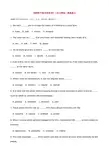
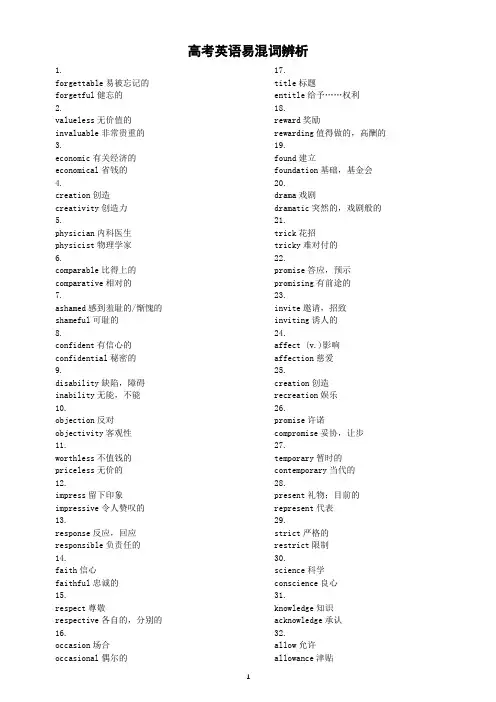
高考英语易混词辨析1.forgettable易被忘记的forgetful健忘的2.valueless无价值的invaluable非常贵重的3.economic有关经济的economical省钱的4.creation创造creativity创造力5.physician内科医生physicist物理学家6.comparable比得上的comparative相对的7.ashamed感到羞耻的/惭愧的shameful可耻的8.confident有信心的confidential秘密的9.disability缺陷,障碍inability无能,不能10.objection反对objectivity客观性11.worthless不值钱的priceless无价的12.impress留下印象impressive令人赞叹的13.response反应,回应responsible负责任的14.faith信心faithful忠诚的15.respect尊敬respective各自的,分别的16.occasion场合occasional偶尔的17.title标题entitle给予……权利18.reward奖励rewarding值得做的,高酬的19.found建立foundation基础,基金会20.drama戏剧dramatic突然的,戏剧般的21.trick花招tricky难对付的22.promise答应,预示promising有前途的23.invite邀请,招致inviting诱人的24.affect (v.)影响affection慈爱25.creation创造recreation娱乐26.promise许诺compromise妥协,让步27.temporary暂时的contemporary当代的28.present礼物;目前的represent代表29.strict严格的restrict限制30.science科学conscience良心31.knowledge知识acknowledge承认32.allow允许allowance津贴33.bowl碗bowling保龄球运动34.instant瞬间instance例子35.search搜查research研究36.sweat汗水,出汗sweet 甜的sweater毛衣37.appointment任命,约定disappointment失望38.stock股票,库存stocking长筒袜39.short短的shortly不久40.inform通知informal非正式的十二、易混词辨析41.easy容易的uneasy不安的;焦虑的41.ensure保证insure投保assure向……保证42.submit提交summit峰会,山峰43.initial最初的essential必不可少的44.contest竞赛context上下文45.pray祈祷spray喷射46.construct建造(v.) instruct指导,指令(v.)47.watch手表,观看match比赛48.succeed成功(v.) success成功(n.)49.image图形,形象,声誉imagine想象50.royal皇室的,高贵的loyal忠诚的51.steal偷steel钢52.access通道assess评价53.pocket口袋packet包54.relieve缓解believe相信55.relief宽慰belief信仰56.bridge桥fridge冰箱57.award奖品reward奖赏58.previous先前的precious宝贵的59.incident事件accident意外60.population人口pollution污染61.invent发明(v.)invest投资(v.)62.respond to对……做出回应correspond to与……一致63.statue雕像status地位,声誉64.source来源resource资源65.surrounding周围的(adj.) surroundings周围环境(n.)66.cure治愈curse诅咒67.sympathy同情(n.) symphony交响曲68.floor地板flour面粉69.college学院colleague同事70.design设计resign辞职71.medal勋章model模型,模特72.elect选举,推选select选择73.patent专利patient病人;有耐心的74.metal金属mental精神上的75.attitude态度altitude海拔76.desert沙漠,遗弃(v.) dessert甜点77.director负责人directory名录78.composition作文,作曲competition比赛79.together一起altogether总共80.consumption消费assumption假设81.apartment公寓套房department部门,大学的系、科82.institution协会constitution宪法,构造83.wonder奇迹,想知道(v.) wander闲逛,徘徊84.explain解释complain投诉,埋怨85.critic批评家critical批评的,至关重要的86.lesson课,教训lessen减少87.band乐队brand品牌,商标88.addition加,增加物addiction入迷,瘾89.import进口export出口90.adapt适应adopt采纳,收养91.tune调子,旋律tone腔调,音调,色调,风格92.section部分,部门,分支session会议,学期93.distribute分配,分发contribute做贡献,促成94.soup汤soap肥皂95.region地区religion宗教96.mount山峰;攀登(v.)amount数量97.personnel人事personal个人的98.nature自然mature (谷物、时机)成熟的99.headline标题deadline截止日期100.leather皮革feather羽毛101.describe描述subscribe订阅,同意102.cease停止tease取笑103.eagle鹰angel 天使angle角度104.contact接触contract合同105.evaluation评价evolution进化106.tension紧张extension延伸,扩大107.distance距离instance例子108.point指向;点appoint任命109.construction建造destruction毁坏120.constitute构成,组成(vt.) substitute替代物;替代(v.)121.tough 坚硬的,棘手的rough粗糙的,粗野的,天气恶劣的122.scare吓唬scarce罕见的,缺乏的123.passage短文,走廊,通道passenger乘客124.include包括(vt.)exclude不包括,排斥(vt.)125.enquire询问acquire获得126.cover覆盖,报道uncover移去盖子recover康复discover发现127.though尽管thought思考through穿过thorough彻底的128.late晚的lately最近later后来 latter后者latest最新的129.deserve值得preserve保护conserve保护reserve保护区;预定(v.)130.broad宽阔的board板;董事会abroad在海外 aboard在飞机/汽车/轮船上131.except除了expect期望respect尊敬inspect视察132.live adj.现场直播的,活的living adj.活着的;健在的,在使用的alive adj.活着的,有活力的lively adj.生气勃勃的133.sensible adj明智的,合理的sensitive adj.敏感的,灵敏的,体贴的134.special adj.特别的,专用的particular adj.专指的,格外的specific adj.明确的,特定的135.effective adj.有效的,实际的efficient adj.效率高的137.rough adj.粗糙的,粗略的,粗暴的tough adj.艰难的,坚强的138.continual adj.连续的,频繁的continuous adj.连续的(指从不间断的) 139.considerable adj.相当多(或大、重要等)的considerate adj.体谅的,考虑周到的140.respectable adj.值得尊敬的,相当好的respectful adj.尊敬的,表示敬意的respected adj.受尊敬的respective adj.分别的,各自的141.likely adj.可能的likable adj.可爱的dislike v.不喜欢alike adj.相似的unlike adj.不同的142.quantity n.数量quality n.质量143.camp n.宿营champion n.冠军campaign n.运动campus n.(大学、学院的)校园144.bank n.银行,库,河畔band n.乐队bond n.关系brand n.品牌145.ash n.灰烬cash n.现金146.sigh v.& n.叹气signal n.信号 v.发信号,表明sign n.标志,迹象v.签署147.flight n.航班,飞行fright n.害怕frighten v.使惊吓fight v.&n.打架,打仗148.advance v.& n.前进,进步adventure n.冒险advantage n.优点149.biology n.生物,生物学biography n.传记150.lie→lay→lain→lying躺,位于lie→lied→lied→lying撒谎lay→laid→laid→laying下(蛋),产(卵),安放,搁delay→delayed→delayed→delaying推迟151.star n.星stare v.凝视starve v.(使)挨饿152.explain v.解释complain v.抱怨plain n.平原adj.平凡的,极普通的153.offend v.冒犯defend v.防御154.rise v.上升raise v.提升,饲养arise v.产生praise v.表扬arouse v.激起155.amaze v.使惊奇amuse v.(使)娱乐156.attract v.吸引attack v.攻击157.effect n.影响affect v.影响(主要指一时的影响,着重影响的动作,可指一般意义的影响,也可指不良影响) influence v.& n.影响(主要指对行为、性格、观点等产生间接的或潜移默化的影响)。
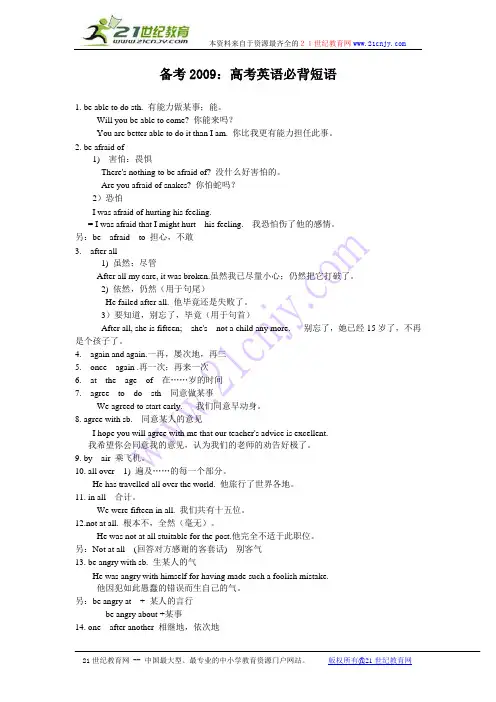
备考2009:高考英语必背短语1. be able to do sth. 有能力做某事;能。
Will you be able to come? 你能来吗?You are better able to do it than I am. 你比我更有能力担任此事。
2. be afraid of1) 害怕:畏惧There's nothing to be afraid of? 没什么好害怕的。
Are you afraid of snakes? 你怕蛇吗?2)恐怕I was afraid of hurting his feeling.= I was afraid that I might hurt his feeling. 我恐怕伤了他的感情。
另:be afraid to 担心,不敢3. after all1) 虽然;尽管After all my care, it was broken.虽然我已尽量小心;仍然把它打破了。
2) 依然,仍然(用于句尾)He failed after all. 他毕竟还是失败了。
3)要知道,别忘了,毕竟(用于句首)After all, she is fifteen; she's not a child any more. 别忘了,她已经15岁了,不再是个孩子了。
4. again and again.一再,屡次地,再三5. once again .再一次;再来一次6. at the age of 在……岁的时间7. agree to do sth 同意做某事We agreed to start early. 我们同意早动身。
8. agree with sb. 同意某人的意见I hope you will agree with me that our teacher's advice is excellent.我希望你会同意我的意见,认为我们的老师的劝告好极了。
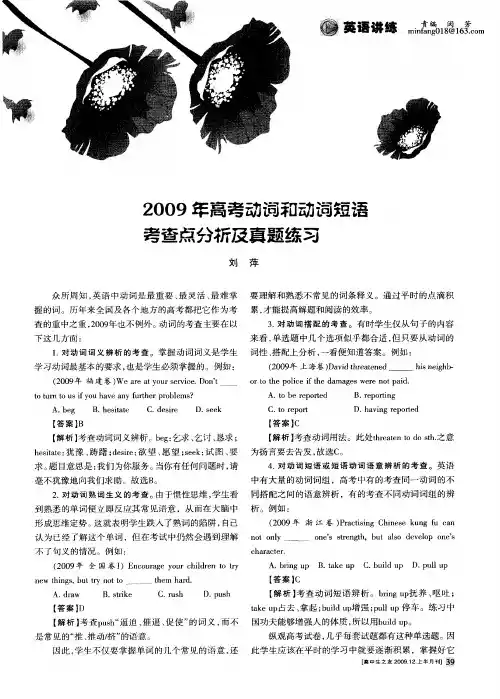
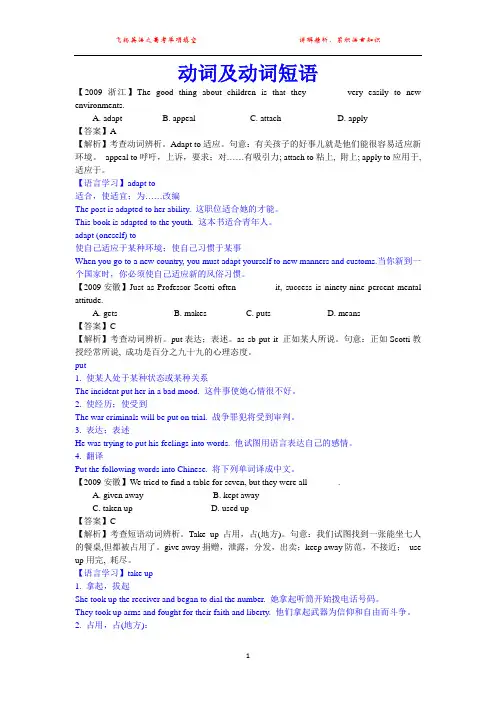
动词及动词短语【2009浙江】The good thing about children is that they _______ very easily to new environments.A. adaptB. appealC. attachD. apply【答案】A【解析】考查动词辨析。
Adapt to适应。
句意:有关孩子的好事儿就是他们能很容易适应新环境。
appeal to呼吁,上诉,要求;对……有吸引力; attach to粘上, 附上; apply to应用于, 适应于。
【语言学习】adapt to适合,使适宜;为……改编The post is adapted to her ability. 这职位适合她的才能。
This book is adapted to the youth. 这本书适合青年人。
adapt (oneself) to使自己适应于某种环境;使自己习惯于某事When you go to a new country, you must adapt yourself to new manners and customs.当你新到一个国家时,你必须使自己适应新的风俗习惯。
【2009安徽】Just as Professor Scotti often_______ it, success is ninety-nine percent mental attitude.A. getsB. makesC. putsD. means【答案】C【解析】考查动词辨析。
put表达;表述。
as sb put it 正如某人所说。
句意:正如Scotti教授经常所说, 成功是百分之九十九的心理态度。
put1. 使某人处于某种状态或某种关系The incident put her in a bad mood. 这件事使她心情很不好。
2. 使经历;使受到The war criminals will be put on trial. 战争罪犯将受到审判。
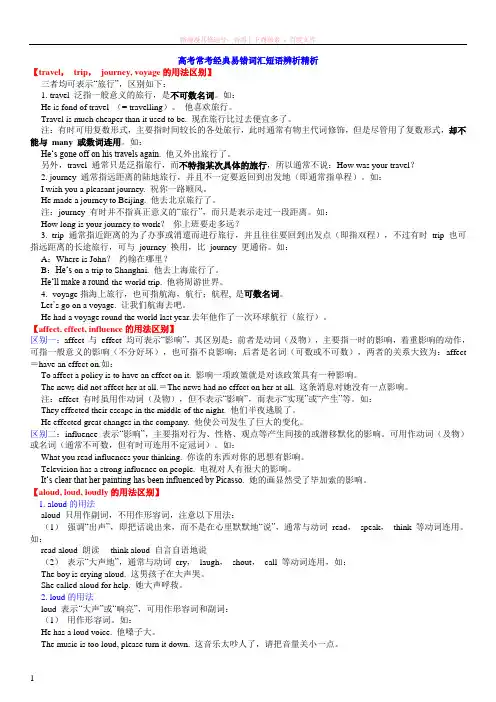
高考常考经典易错词汇短语辨析精析【travel,trip,journey, voyage的用法区别】三者均可表示“旅行”,区别如下:1. travel 泛指一般意义的旅行,是不可数名词。
如:He is fond of travel (= travelling)。
他喜欢旅行。
Travel is much cheaper than it used to be. 现在旅行比过去便宜多了。
注:有时可用复数形式,主要指时间较长的各处旅行,此时通常有物主代词修饰,但是尽管用了复数形式,却不能与many 或数词连用。
如:He‘s gone off on his travels again. 他又外出旅行了。
另外,travel 通常只是泛指旅行,而不特指某次具体的旅行,所以通常不说:How was your travel?2. journey 通常指远距离的陆地旅行,并且不一定要返回到出发地(即通常指单程)。
如:I wish you a pleasant journey. 祝你一路顺风。
He made a journey to Beijing. 他去北京旅行了。
注:journey 有时并不指真正意义的“旅行”,而只是表示走过一段距离。
如:How long is your journey to work?你上班要走多远?3. trip 通常指近距离的为了办事或消遣而进行旅行,并且往往要回到出发点(即指双程),不过有时trip 也可指远距离的长途旅行,可与journey 换用,比journey 更通俗。
如:A:Where is John?约翰在哪里?B:He‘s on a trip to Shanghai. 他去上海旅行了。
He‘ll make a round-the-world trip. 他将周游世界。
4.voyage指海上旅行,也可指航海,航行;航程, 是可数名词。
Let’s go on a voyage. 让我们航海去吧。
高考常考经典易错词汇短语辨析精析【travel,trip,journey, voyage的用法区别】三者均可表示“旅行”,区别如下:1. travel 泛指一般意义的旅行,是不可数名词。
如:He is fond of travel (= travelling)。
他喜欢旅行。
Travel is much cheaper than it used to be. 现在旅行比过去便宜多了。
注:有时可用复数形式,主要指时间较长的各处旅行,此时通常有物主代词修饰,但是尽管用了复数形式,却不能与many 或数词连用。
如:He‘s gone off on his travels again. 他又外出旅行了。
另外,travel 通常只是泛指旅行,而不特指某次具体的旅行,所以通常不说:How was your travel?2. journey 通常指远距离的陆地旅行,并且不一定要返回到出发地(即通常指单程)。
如:I wish you a pleasant journey. 祝你一路顺风。
He made a journey to Beijing. 他去北京旅行了。
注:journey 有时并不指真正意义的“旅行”,而只是表示走过一段距离。
如:How long is your journey to work?你上班要走多远?3. trip 通常指近距离的为了办事或消遣而进行旅行,并且往往要回到出发点(即指双程),不过有时trip 也可指远距离的长途旅行,可与journey 换用,比journey 更通俗。
如:A:Where is John?约翰在哪里?B:He‘s on a trip to Shanghai. 他去上海旅行了。
He‘ll make a round-the-world trip. 他将周游世界。
4.voyage指海上旅行,也可指航海,航行;航程, 是可数名词。
Let’s go on a voyage. 让我们航海去吧。
高考英语重点词汇辨析和易错词汇介绍1.accuse / chargeaccuse 和charge都有“指责,控告”之意,有时可通用,但结构不一样。
accuse不一定针对重大过失或罪行,其结构为accuse sb of sth。
而charge一般用于重大过失或罪行,其结构为charge sb with sth,此结构还有“使某人负有……责任”之意。
例如:例1:My father accused me of my being too careless. 父亲责备我太粗心。
例2:He accused me of neglecting my duty. 他指控我玩忽职守。
例3:He charged me with neglecting my duty. 同上例4:Jimmy was charged with murder. 吉米被控谋杀。
例5:He was charged with an important task. 他担负有一项重要任务。
2.add / add to / add up / add up toadd:增加,把……加上。
add…to…:把……加到。
例如:例6:At the end of the party, we added another program.例7:You needn’t add any water to the medicine.add to:增添。
指增添喜悦、悲伤、麻烦等。
例如:例8:His coming added to our trouble. 他的到来给我们添了麻烦。
add up:加起来。
例如:例9:Have you added up all the numbers?add up to:总计。
表示加起来的结果,无被动结构。
例如:例10:All the numbers added up to 100.3.advise / suggestadvise:建议,劝说。
例如:例11:I advised his trying again. = suggest例12:I advised that we should try again. = suggest,虚拟语气。
2009年高考英语第一轮复习常考经典易错词汇短语辨析精析 travel, trip, journey的用法区别 三者均可表示“旅行”,区别如下: 1. travel 泛指一般意义的旅行,是不可数名词。如: He is fond of travel (= travelling)。 他喜欢旅行。 Travel is much cheaper than it used to be. 现在旅行比过去便宜多了。
注:有时可用复数形式,主要指时间较长的各处旅行,此时通常有物主代词修饰,但是尽管用了复数形式,却不能与 many 或数词连用。如:
He‘s gone off on his travels again. 他又外出旅行了。 另外,travel 通常只是泛指旅行,而不特指某次具体的旅行,所以通常不说:How was your travel?
2. journey 通常指远距离的陆地旅行,并且不一定要返回到出发地(即通常指单程)。如:
I wish you a pleasant journey. 祝你一路顺风。 He made a journey to Beijing. 他去北京旅行了。 注:journey 有时并不指真正意义的“旅行”,而只是表示走过一段距离。如:
How long is your journey to work? 你上班要走多远? 3. trip 通常指近距离的为了办事或消遣而进行旅行,并且往往要回到出发点(即指双程),不过有时 trip 也可指远距离的长途旅行,可与 journey 换用,比 journey 更通俗。如:
A:Where is John? 约翰在哪里? B:He‘s on a trip to Shanghai. 他去上海旅行了。 He‘ll make a round-the-world trip. 他将周游世界。 affect, effect, influence用法区别 区别一:affect 与 effect 均可表示“影响”,其区别是:前者是动词(及物),主要指一时的影响,着重影响的动作,可指一般意义的影响(不分好坏),也可指不良影响;后者是名词(可数或不可数),两者的关系大致为:affect=have an effect on.如:
To affect a policy is to have an effect on it. 影响一项政策就是对该政策具有一种影响。 The news did not affect her at all.=The news had no effect on her at all. 这条消息对她没有一点影响。
注:effect 有时虽用作动词(及物),但不表示“影响”,而表示“实现”或“产生”等。如:
They effected their escape in the middle of the night. 他们半夜逃脱了。
He effected great changes in the company. 他使公司发生了巨大的变化。
区别二:influence 表示“影响”,主要指对行为、性格、观点等产生间接的或潜移默化的影响。可用作动词(及物)或名词(通常不可数,但有时可连用不定冠词)。如:
What you read influences your thinking. 你读的东西对你的思想有影响。
Television has a strong influence on people. 电视对人有很大的影响。
It‘s clear that her painting has been influenced by Picasso. 她的画显然受了毕加索的影响。
aloud, loud, loudly的用法区别 1. aloud的用法 aloud 只用作副词,不用作形容词,注意以下用法: (1) 强调“出声”,即把话说出来,而不是在心里默默地“说”,通常与动词 read, speak, think 等动词连用。如:
read aloud 朗读 think aloud 自言自语地说 (2) 表示“大声地”,通常与动词 cry, laugh, shout, call 等动词连用,如:
The boy is crying aloud. 这男孩子在大声哭。 She called aloud for help. 她大声呼救。 2. lould的用法 loud 表示“大声”或“响亮”,可用作形容词和副词: (1) 用作形容词。如: He has a loud voice. 他嗓子大。 The music is too loud; please turn it down. 这音乐太吵人了,请把音量关小一点。
(2) 用作副词(与 loudly 同义),一般只与动词 speak, talk, laugh, sing 等连用,且必须放在这些动词之后。如: I can‘t hear you, please speak louder. 我听不见,请说大声些。
3. loudly的用法 loudly 只用作副词(与用作副词的 loud 同义)。如: Don‘t talk so loudly [loud]. 别这么大声讲话。 注:loudly 比用作副词的 loud 使用范围更广,它除与 speak,talk,laugh 等动词连用外,还可与其他表示声响的动词连用,且可以放在这些动词之前或之后。如:
The man snored loudly. 这个人鼾声打得响。 He heard a cocklock loudly crow. 他听见雄鸡大声啼叫。 另外,在用于比较级或最高级时,通常用 loud,而不用 loudly.如:
Who laughed loudest? 谁笑的声音最大? in the air与on the air 1. in the air 在空中;在流传中;渺茫。如: Birds fly in the air. 鸟在空中飞。 There was thunder in the air. 天上打着雷。 The plan is quite (up) in the air. 计划还相当渺茫。 Look, hold it uP in the air like this. 看着,像这样把它举在空中。
2. on the air 在广播中。如: The show is on the air. 演出正在转播。 I heard the news on the air. 我在广播中听到了这条消息。
What‘s on the air this evening? 今晚有什么广播节目? The show is on the air at seven o‘clock. 这次演出七点钟播出。
until与till的用法区别 用作介词或连词,意为“直到(„„为止”,两者常可换用,只是 until 比 till 稍正式,所以在正式文体中,一般用 until,而在口语或非正式文体中则两者都可用。从其后所接成分来看,till多与名词或较短的从句连用,而较长较复杂的成分多用 until,位于句首时也多用 until.
两者在用法上应注意以下几点: 1. 相关主句谓语必须是持续性动词,若是终止性动词,则应为否定式(因为终止性动词一旦被否定就成为状态,便可持续)。如:
We waited until [till] he came. 我们一直等到他来。 We didn‘t leave until [till] he came. 直到他来我们才走。
2. 引导时间状语从句时,其谓语要用现在时表示将来意义。如:
I won‘t leave until he comes back tomorrow. 我要等他明天回来再走。
3. 有时其后可跟副词、介词短语或从句等。如: He has been ill until recently. 他最近一直生病。 She didn‘t return until after twelve o’clock. 直到 12 点过后她才回来。
They didn‘t reach the station until after the train had left. 直到火车开走之后,他们才到达车站。
Until when are you going to stay here? 你在这儿要待到什么时候? before long与long before 1. before long 的意断是“不久,很快”。如: I‘ll be back before long. 不久我就回来。 Before long he got married. 不久他就结婚了。 2. long before有两个用法: (1) 老早,早就(单独使用,表示比过去某时早得多的时间)。如:
She had left long before. 她老早就离开了。 That had happened long before. 那事老早就发生了。 注:long ago 表示“很久以前”,•指的是从现在算起的很久以前,通常与一般过去时连用:
I met him long ago. 我很久以前就认识他了。 (2) 在„„的很久以前,在还没有„„的很久以前。如: She had left long before his return [he returned]. 在他回来的很久以前她就走了。
He had worked in the factory long before he got married. 在他还没有结婚的很久以前他就在这家工厂工作了。